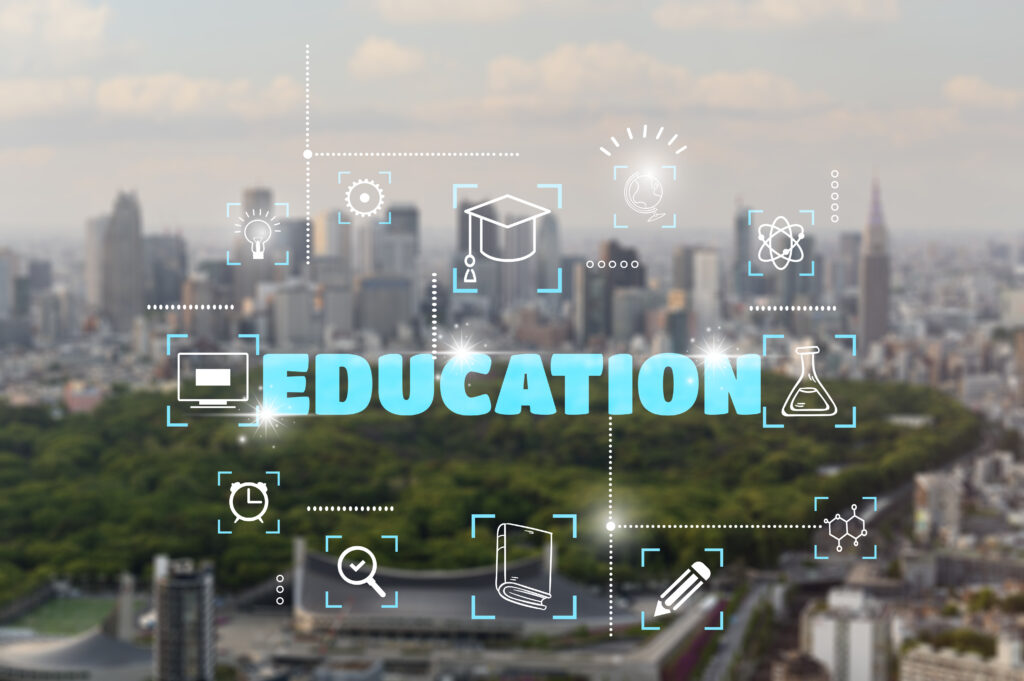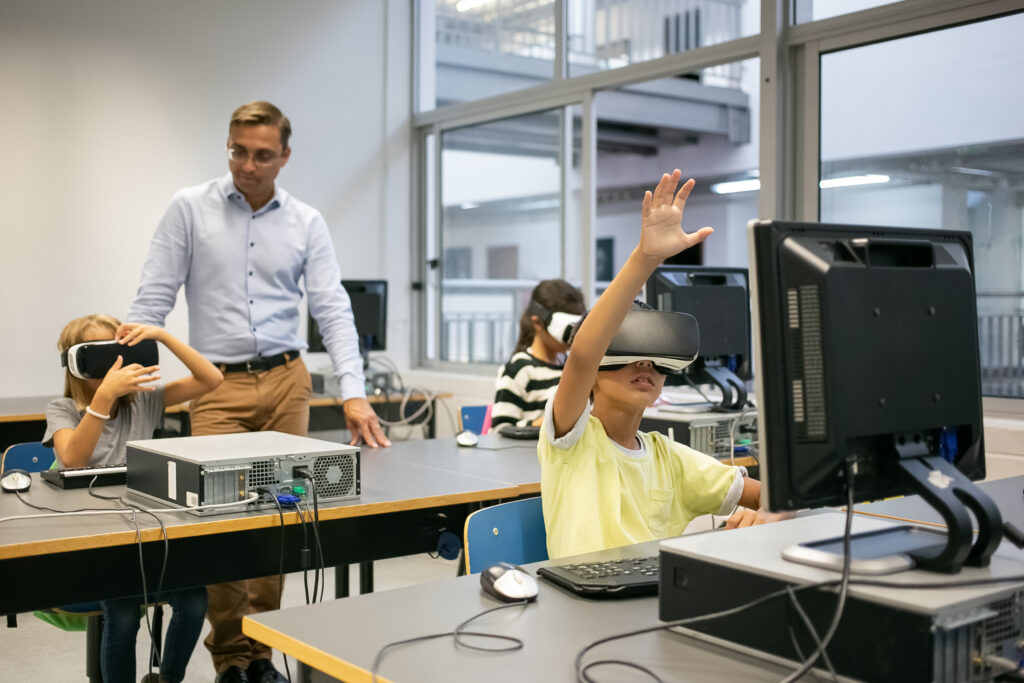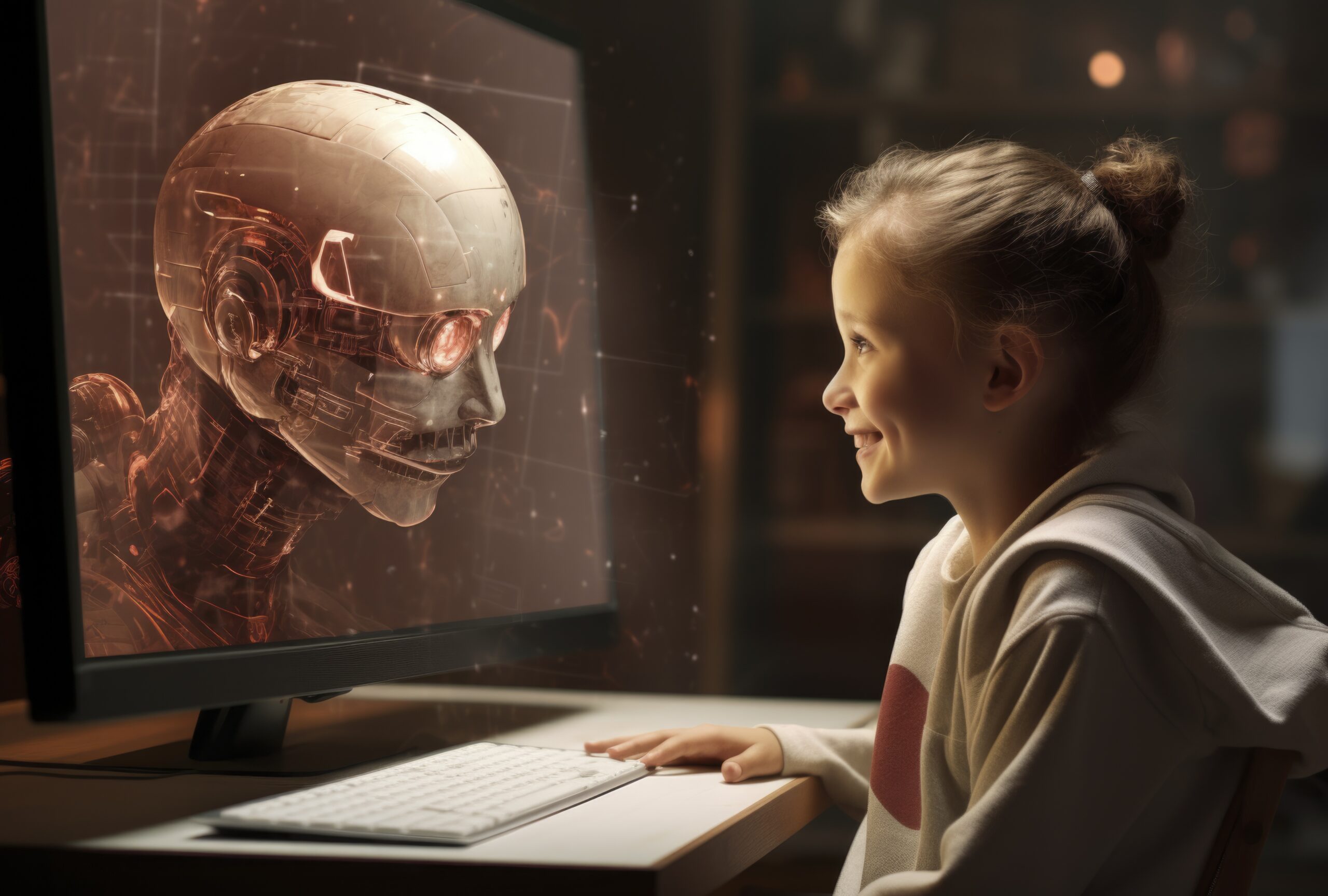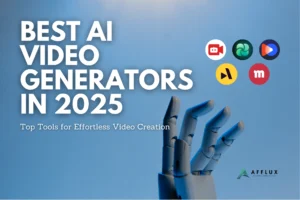Exploring AI’s Role in Education
Artificial Intelligence (AI) in education represents a significant evolution in teaching and learning methodologies, fundamentally altering how educational content is delivered and consumed. At its core, AI encompasses various technologies that enable machines to perform tasks typically requiring human intelligence, such as recognizing patterns, making decisions, and learning from experience. This has led to the development of intelligent systems that can adapt to individual learning needs and preferences, thereby enhancing educational outcomes.
The evolution of AI in education has seen a gradual integration of technology into traditional learning environments. Initially, educational technology comprised simple tools that facilitated learning, such as digital textbooks and online courses. However, with advancements in machine learning, natural language processing, and data analytics, AI has begun to play a critical role. These technologies allow for more personalized learning experiences, where tools can assess student performance in real-time, adjusting content delivery accordingly to suit diverse learning styles.
As we look ahead to 2025, various advancements are anticipated that will further refine AI’s role in education. Innovations such as intelligent tutoring systems, which provide real-time feedback and support tailored to individual learning pathways, are expected to become more prevalent. Additionally, AI-powered analytics can help educators identify students who may need additional support, enabling early interventions to improve academic performance. The integration of AI in education is also anticipated to expand beyond formal institutions to include lifelong learning and professional development, reflecting the continuous need for skill enhancement in a rapidly changing job market. For a broader look at AI’s impact, explore AI in 2025: Transforming Everyday Life.
Ultimately, AI in education aims to create a more adaptive, efficient, and inclusive learning environment, addressing the unique challenges faced by learners and educators alike. This introduction sets the stage for a deeper exploration into specific applications of AI in education and their profound implications for the future of learning.
As of 2023, the integration of artificial intelligence in education has reached a significant level of adoption, transforming various aspects of learning and teaching. Educational institutions worldwide are increasingly utilizing AI technologies to enhance the overall learning experience, streamline administrative processes, and provide personalized instruction to students. Among the prominent tools being employed are intelligent tutoring systems, automated grading systems, and sophisticated learning analytics platforms. These technologies are designed to support educators and facilitate tailored educational pathways for learners.
Current State of AI in Education
Intelligent tutoring systems that employ AI algorithms are capable of delivering personalized feedback and guidance, allowing students to learn at their own pace. For instance, platforms like Carnegie Learning use AI to adapt math instruction to the specific needs of each student, thereby maximizing their learning potential. This individualized approach to education not only fosters better engagement but also contributes to improved academic performance among learners.
Automated grading technologies are another significant development in the field. AI-driven solutions, such as Gradescope, help educators streamline the grading process by enabling efficient assessment of student assignments and providing immediate feedback. This automation allows instructors to focus more time on instructional strategies and student interaction rather than administrative tasks.

Furthermore, learning analytics powered by AI enable institutions to harness data effectively, offering insights into student engagement and performance. These analytics help educators identify at-risk students, enabling timely interventions that can enhance educational outcomes. A notable case study is that of Georgia State University, which utilized predictive analytics to significantly boost retention rates by identifying and supporting students who were likely to drop out.
Overall, the current state of AI in education reflects a growing partnership between technology and pedagogy, paving the way for innovative learning environments that prioritize student success and engagement. As educational institutions increasingly embrace these advancements, the landscape of teaching and learning continues to evolve, offering new possibilities for learners and educators alike.
Personalized Learning Experiences
Artificial intelligence is revolutionizing the education sector by enhancing personalized learning experiences for students. Through sophisticated algorithms, AI can assess an individual student’s learning style, preferences, and pace, allowing educators to tailor curricula and interventions to meet diverse needs effectively. This shift toward personalization is significant, as it acknowledges that each student has unique insights and methods of absorbing information.
For instance, AI-driven platforms such as DreamBox Learning and Smart Sparrow utilize data analytics to monitor student progress in real-time, adapting the educational content accordingly. These platforms adjust the difficulty level of questions based on the student’s performance, thus ensuring that learners are neither overwhelmed nor under-challenged. Such individualized pathways foster a conducive learning environment, where students can thrive at their own pace, thereby maximizing their engagement and understanding.
Moreover, the implementation of AI in personalized learning extends beyond mere academic adjustments. Tools like Knewton and Carnegie Learning employ artificial intelligence to analyze behavioral patterns, identifying when a student may require additional support or alternative resources. This level of insight allows educators to intervene promptly, addressing issues before they become significant hurdles in a student’s educational journey.
In mathematics education, for example, AI tools can present complex concepts using visual aids and interactive elements that are tailored to a student’s preferred learning style. By doing so, these technologies not only enhance comprehension but also foster a love for learning that may have been lost in a traditional, one-size-fits-all educational approach.
The potential of AI in facilitating personalized learning experiences is immense. As educational institutions begin to embrace these technologies, the future of education looks promising, catering to the individual needs of every learner. This evolution not only improves academic outcomes but also prepares students for a dynamically changing world.
AI in Assessment and Feedback
The integration of artificial intelligence (AI) in education has revolutionized assessment methods, offering educators valuable tools to evaluate student performance more effectively. Automated assessment systems, powered by AI, enable real-time evaluations of student work, providing immediate insights into learner progress. These systems utilize machine learning algorithms to analyze written assignments, quizzes, and exams, often delivering results much faster than traditional grading methods. By streamlining the assessment process, AI not only saves time for educators but also ensures that students receive prompt feedback, which is crucial for their learning trajectory.
Immediate feedback plays a significant role in the learning process. When students receive timely evaluations, they are better equipped to understand their strengths and weaknesses and can adjust their study strategies accordingly. AI-driven platforms often provide personalized feedback, tailored to each student’s learning needs. This individualized approach allows learners to engage with content at their own pace, promoting mastery of complex subjects. Furthermore, the incorporation of AI into assessments can lead to more accurate evaluation outcomes, minimizing human biases and errors frequently found in traditional grading systems.
Moreover, through sophisticated data analysis, AI can identify trends in student performance that may not be immediately apparent to educators. By analyzing collective assessment results, AI systems can highlight areas where students struggle, driving instructional improvements. Educators can then adapt their teaching methods based on insights gathered from data analytics, ensuring that their instructional approaches align with student needs. In this manner, AI not only enhances assessment and feedback mechanisms but also contributes to the overall optimization of educational practices, ultimately fostering a more effective learning environment for all students.
Ethical Considerations in AI-Driven Education
The integration of artificial intelligence (AI) within educational systems presents multiple ethical challenges that must be navigated carefully. One of the foremost concerns is data privacy. As educational institutions increasingly utilize AI technologies to collect and analyze student data, the potential for misuse or mishandling of this information becomes a pressing issue. Protecting sensitive student information from breaches and ensuring compliance with data protection regulations is crucial for maintaining trust within educational environments.
Another significant challenge is algorithmic bias. AI systems are only as good as the data they are trained on, and if that data reflects societal biases, it can lead to unfair outcomes. For instance, if an AI algorithm is programmed using data that underrepresents certain demographics, it may unfairly disadvantage those groups in personalized learning environments. Educators and institutions must critically evaluate the algorithms they implement, ensuring that they promote equity and inclusivity in educational opportunities.
Transparency is also a vital ethical consideration when deploying AI in education. Stakeholders, including students, parents, and educators, should have access to information regarding how AI tools make decisions that affect student learning. This level of transparency can help to demystify AI applications and alleviate concerns regarding their fairness and effectiveness. Additionally, institutions have a responsibility to provide training for educators on the ethical use of these technologies, empowering them to make informed decisions about integrating AI into their teaching methodologies.
Ultimately, as AI continues to shape learning experiences, it is imperative that educational leaders prioritize ethical considerations to ensure that technology serves as a positive force in promoting equitable and effective education. By addressing issues related to data privacy, algorithmic bias, and transparency, educators can foster an environment where AI enhances learning while simultaneously upholding ethical standards.
Integrating AI into Curricula
As artificial intelligence continues to permeate various sectors, educators are increasingly tasked with incorporating AI concepts into their curricula. Effective integration of AI not only enhances learning but also fosters essential skills needed for future job markets. Teachers can develop units that explore the fundamentals of AI, its applications across disciplines, and the ethical implications surrounding its use.
A significant starting point is the establishment of a dedicated AI literacy module within existing subjects. In this unit, students can engage with the basics of machine learning, natural language processing, and data analysis. This foundational understanding is crucial, as it empowers students to critically evaluate AI technologies and their effects on society. For instance, incorporating case studies about AI in healthcare, finance, and environmental management can stimulate discussions on real-world applications while honing analytical skills.
Moreover, innovative teaching strategies should be adopted to engage students actively. Problem-based learning, where students tackle real-life challenges with AI tools, can enhance creativity and critical thinking. This approach not only solidifies students’ theoretical knowledge but also prepares them for hands-on experiences in the workplace. Role-playing scenarios, simulations, and projects can further immerse students in the AI landscape, encouraging collaborative problem-solving.

In addition, educators should consider the importance of ethical discussions surrounding AI. As students become more technologically proficient, they must also grapple with questions of privacy, bias, and the societal impact of automated systems. By inviting guest speakers from the tech industry, conducting debates, and facilitating workshops, teachers can enrich students’ understanding of these vital issues.
Incorporating AI into curricula is a multifaceted endeavor that requires careful planning and execution. By focusing on AI literacy, critical thinking, and real-world applications, educators can effectively prepare students for the evolving demands of a technologically advanced future.
Future Trends: AI Innovations for 2025 and Beyond
As we look forward to 2025, the integration of artificial intelligence (AI) in education is poised to reshape the learning landscape significantly. One of the most anticipated advancements is in the field of natural language processing (NLP), which enhances communication between educators and students. With AI-powered tools, the potential for personalized learning experiences can be realized, enabling students to receive immediate feedback and support tailored to their unique needs. NLP systems are expected to evolve, providing more sophisticated conversational interfaces and helping students grasp complex concepts through interactive dialogue.
Alongside NLP, the incorporation of virtual and augmented reality (VR and AR) into educational settings is set to revolutionize traditional teaching methods. These technologies allow learners to immerse themselves in interactive environments where they can explore historical events, conduct virtual science experiments, or simulate real-world scenarios. By combining AI with VR and AR, educators can create adaptive learning experiences that respond to students’ performance in real-time, enhancing engagement and retention of information. The ability to visualize abstract concepts and experience them firsthand is likely to lead to improved academic outcomes.
Moreover, AI’s role in supporting lifelong learning is also gaining traction. As the job market continues to evolve, the need for continuous skill development becomes increasingly important. AI-driven platforms are expected to provide personalized learning pathways that facilitate adult education, enabling individuals to acquire new skills at their own pace. This trend towards lifelong learning supported by AI not only addresses the skills gap but also promotes a culture of learning that extends beyond formal education. By 2025, experts predict that we will see more emphasis on AI systems that can assess employee competencies and recommend relevant courses or career development opportunities.
The Role of Educators in an AI-Driven World
As artificial intelligence continues to permeate various sectors, its impact on education is undeniable. The traditional role of educators is evolving alongside these technological advancements. In an AI-driven educational landscape, teachers now serve as facilitators, guiding students in ways that integrate AI tools to optimize learning outcomes. This transformation allows educators to leverage AI for personalized instruction, enabling them to create tailored learning experiences that cater to the diverse needs of their students.
AI tools, such as intelligent tutoring systems and adaptive learning platforms, provide educators with valuable insights into student progress, strengths, and areas for improvement. By harnessing the potential of these technologies, teachers can develop more effective teaching strategies and interventions. This not only improves academic performance but also enhances student engagement and motivation. Educators can utilize AI-driven analytics to identify learning trends, thereby allowing them to adjust their teaching methods in real-time, ensuring that every student receives the support they require.

However, as the role of educators shifts, so too does the need for ongoing professional development in AI competencies. Educators must be equipped with the necessary skills to navigate the complexities of AI technologies effectively. Training programs that focus on AI integration in the classroom will empower teachers to embrace innovation and enhance their pedagogical approaches. Furthermore, it is crucial for educators to maintain the essential human connection that is the cornerstone of effective learning. While AI can augment the educational experience, it cannot replace the empathy, understanding, and interpersonal relationships that are vital for student success.
In this new educational paradigm, the dual responsibility of educators lies in leveraging AI tools for enhanced learning while committing to professional growth and sustaining authentic connections with students. This balanced approach ensures that the human aspect of education remains intact, fostering an environment where technology and personal interaction coalesce harmoniously.
Harnessing AI for a Better Learning Future
As we navigate through the transformative landscape of education, it is evident that artificial intelligence (AI) is playing a pivotal role in enhancing learning outcomes for students globally. Throughout this blog post, we have explored various dimensions of AI integration in educational settings, showcasing how personalized learning experiences, efficient administrative processes, and intelligent tutoring systems are redefining traditional learning methodologies. AI empowers educators by providing tailored resources that meet individual student needs, thereby fostering an environment conducive to academic success.
The potential of AI to analyze vast amounts of data enables teachers to identify patterns and insights that were previously unattainable. This data-driven approach allows for proactive interventions, ensuring that struggling learners receive the support they require in a timely manner. Moreover, AI systems can free educators from repetitive tasks, allowing them to concentrate on what truly matters: engaging with students and cultivating their intellectual growth.
However, it is crucial to acknowledge the responsibilities that accompany the implementation of AI in education. Collaboration among educators, technology developers, and policymakers will be essential to ensure that AI is utilized ethically and equitably. This partnership should focus on developing AI solutions that are transparent, accessible, and designed inclusively to cater to diverse learner populations. Safeguarding student data privacy and maintaining trust in AI systems must also be a priority as education becomes increasingly automated. For further reading on ethical AI use, see UNESCO’s AI Ethics Guidelines.
Ultimately, embracing AI in education is not merely about integrating new technologies; it is about reimagining how we approach teaching and learning. The future of education lies in creating an ecosystem where AI aids educators and enriches student experiences, ensuring that we prepare learners for a rapidly changing world. By committing to constructive collaboration and responsible deployment of AI, we can transform education into a more effective, engaging, and inclusive experience for all.





